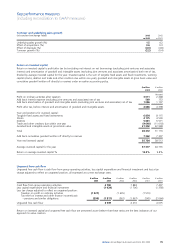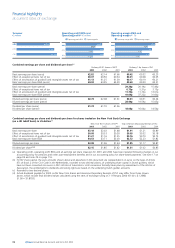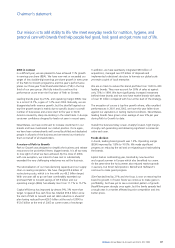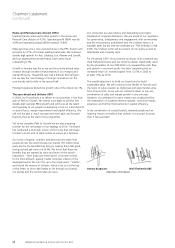Unilever 2003 Annual Report Download - page 18
Download and view the complete annual report
Please find page 18 of the 2003 Unilever annual report below. You can navigate through the pages in the report by either clicking on the pages listed below, or by using the keyword search tool below to find specific information within the annual report.
Unilever Annual Report & Accounts and Form 20-F 2003 15
Financial review
Basis of reporting and discussion
Our accounting policies are based on United Kingdom generally
accepted accounting principles (GAAP) and UK and Netherlands
law. These differ in certain respects from United States GAAP. The
principal differences are described on page 132. We have shown
reconciliations to net income and capital and reserves under US
GAAP on pages 131 and 132.
For definitions of key ratios referred to in this review please refer
to page 126.
Amounts discussed in the financial review have been restated
following changes in our accounting policies for pensions, share-
based payments and for the presentation of collateral. See note
14 on page 94, note 17 on page 99 and note 29 on page 116.
Reporting currency and exchange rates
Foreign currency amounts for results and cash flows are
translated from underlying local currencies into euros using
annual average exchange rates; balance sheet amounts are
translated at year-end rates except for the ordinary capital of the
two parent companies. These are translated at the rate prescribed
by the Equalisation Agreement of £1 = Fl. 12, and thence to
euros at the official rate of €1.00 = Fl. 2.20371 (see Control of
Unilever on page 152).
The figures quoted in the following discussion on pages 15 to 20
are in euros, at current rates of exchange, unless otherwise
stated, ie the average or year-end rates of each period.
International Financial Reporting Standards
Unilever will adopt International Financial Reporting Standards
(IFRS) with effect from 1 January 2005. The implementation of
IFRS is a major change process for which we have established a
project team and are dedicating considerable resource. The
impact of the change to IFRS on our reported capital and reserves
and on reported net profit is being assessed. In particular, our
current accounting policies for retirement benefits, financial
instruments, goodwill and intangible assets, biological assets,
deferred taxes and proposed dividends differ from IFRS.
Critical accounting policies
The accounts comply in all material respects with UK GAAP and
UK and Netherlands law. To prepare the accounts, we are
required to make estimates and assumptions, using judgement
based on available information, including historical experience.
These estimates and assumptions are reasonable and are re-
evaluated on an ongoing basis. However, actual amounts and
results could differ. Critical accounting policies are those which
are most important to the portrayal of Unilever’s financial position
and results of operations, and are described on pages 73 to 75.
Unilever complies with UK Financial Reporting Standard 18,
which requires that the most appropriate accounting policies
are selected in all circumstances. Some of these policies require
difficult, subjective or complex judgements from management,
the most important being:
Retirement benefits
From 1 January 2003 we have adopted United Kingdom Financial
Reporting Standard 17 (FRS 17) ’Retirement Benefits’, which
requires that pension assets and liabilities be stated at fair values.
The impact of adoption of this standard has been reflected by
means of prior period adjustments to the balance sheets and
profit and loss accounts.
The determination of Unilever’s pension assets, obligations and
expenses depends on certain assumptions used by actuaries in
calculating such amounts. The valuation of pension obligations
is particularly sensitive to the assumptions made in respect of
discount rates and inflation rates; these discount rates, together
with the assumptions made in respect of the expected long-term
rates of return on assets, also determine the amounts to be
included in the profit and loss account in respect of pension fund
financing. The table below sets out these assumptions, as at 31
December 2003, in respect of the four largest Unilever pension
funds. Details of all assumptions made are given on page 100.
%%%%
Nether- United
UK lands States Germany
Discount rate 5.40 5.20 6.10 5.20
Inflation assumption 2.70 1.80 2.50 1.80
Expected long-term rate of return:
Equities 8.30 8.30 8.60 8.30
Bonds 5.30 4.70 4.70 4.70
Others 6.40 6.80 4.70 5.50
Although the assumptions made are thought to be appropriate,
significant differences in actual experience or significant changes
in assumptions may materially affect pension assets and
obligations and future expenses.
Share-based compensation
In line with recommendations of various standard setting bodies,
from 1 January 2003 we changed our accounting policy for share
options. We have been hedging our existing share option
programmes by buying shares at the time of grant and taking the
financing cost within interest. The accounting change is to include
an additional non-cash charge against operating profit to reflect
the fair value to the employee of the share options granted. Since
there is a consensus among the world’s accounting standard
bodies that this approach gives the most appropriate accounting
treatment, Unilever believes that companies should adopt the
proposals in order to improve the comparability of reported
results. The impact of the adoption of this change has been
reflected by means of prior period adjustments to the profit and
loss accounts and balance sheets. In determining the additional
charge, we are applying a Black-Scholes based valuation spread
over the vesting period of the option. The fair value so calculated
depends on certain assumptions which are described in note 29
on page 116. The assumptions made in respect of share price
volatility and expected dividend yields are particularly subjective.
Unilever considers these and all other assumptions to be
appropriate, but significant changes in assumptions could
materially affect the charge recorded.
Provisions
Provision is made, among other reasons, for environmental and
legal matters and for employee termination costs where a legal or
constructive obligation exists at the balance sheet date and a
reasonable estimate can be made of the likely outcome.
Market support costs
Expenditure on market support costs, such as consumer
promotions and trade advertising, is charged against profit in the
year in which it is incurred. At each balance sheet date, we are
required to estimate the part of expenditure incurred but not yet
























